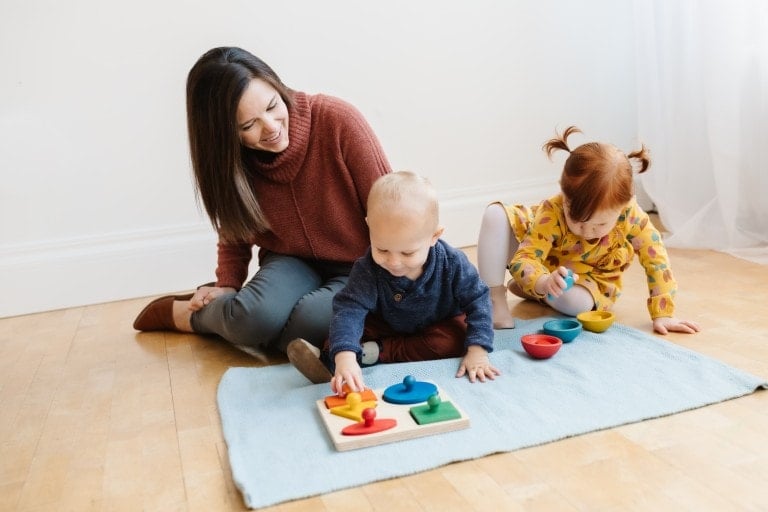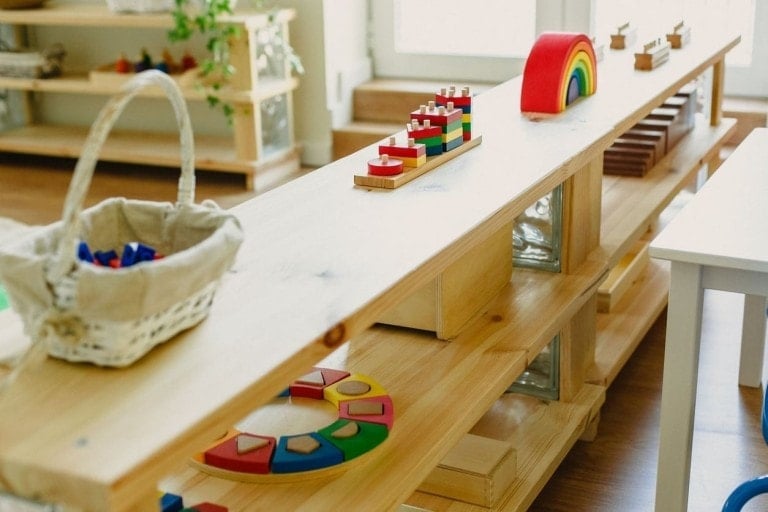Parents are becoming more interested in Montessori schools for their children. However, you don’t have to send your child to a Montessori school to use some of the same Montessori methods for learning at home. At the core of the Montessori method is teaching your toddler independence.1 And the great thing is that toddlers are so eager to learn and do things independently! By allowing your child to become more independent, you may find that power struggles start to decrease. This is because your child feels more in control of what’s happening around them. Plus, you may even find that fostering a little independence helps cut down on some toddler tantrums happening around your house as your toddler starts to learn how to do things independently.
5 Montessori Approaches to Fostering Independence in Your Toddler
Let’s look at five Montessori approaches to helping your little one become more independent.
1. Help Your Child Through The “I Can Do It Myself” Phase
Toddlers go through many developmental phases. And most toddlers will hit a period where they are adamant about doing things themselves. You can use Montessori approaches to help them do things on their own.
So, if your toddler insists on getting themselves dressed each morning, give them a little extra time to do so. Set them up for success! Maybe offer to help with the buttons on their shirt while putting their hands and arms through. Ask them to help you with self-care tasks such as brushing their teeth and hair or putting on their shoes.
The more you get them involved, the more they will feel like they are doing it themselves. And the less frustration there will be. It will also help support that desire for independence, and soon enough, they really will be doing it themselves!
2. Ask Questions
A big part of helping your want-to-be independent toddler is allowing them some freedom to express that desire for independence. A way to do this safely and helpfully is to ask more questions that will enable your toddler to answer with their own opinions.
For example, pick two options instead of telling your child what they will have for breakfast. Then ask them if they would like a bowl of oatmeal or a smoothie. Giving them options that you choose, but asking which one they want, is an excellent way to get your toddler involved and help them feel more in control. Hey, you may find your toddler even eats more this way. Win, win!
3. Set up a Montessori Play Area
If your toddler were to go to a Montessori school, they would be in a classroom where everything would be set up for a successful day. There would be child-sized tables, supplies, and toys. These would all be things a toddler could use on their own to practice independence.
You can do the same thing at home, whether you have a whole room dedicated to playtime or a small space in the corner of your living room. Set up an area where your toddler can explore and be totally independent. But the trick here is to have some organization, as toddlers do not thrive in clutter. Set up some shelves they can reach with a few toys out at a time.
You can set up other areas of the house using Montessori approaches to safely allow for independence. Get your toddler involved in helping you put their dirty clothes in their hamper at the end of the day. Maybe get a child-sized table your toddler can use in the kitchen when you are prepping dinner, where they have their own child-sized plates, spoons, and cups. Setting up child-sized workstations and chores will encourage them to take responsibility and independently contribute to the home.
4. Teach & Encourage Your Toddler to Learn Different Skills
It probably already seems like your toddler is learning new skills every day. But this is such an important time to encourage skill-building! And you can help your toddler learn new things by teaching them one skill at a time.
In a Montessori classroom environment, kids are introduced to new skills slowly and build upon skills one step at a time.2 Encourage simple skills building by allowing your toddler to start to feed herself, drink from a cup vs. a sippy cup, wash her hands, and even help with things like baking. These Montessori approaches allow them to learn small but helpful independence skills.
5. Allow For Extra Time
Patience and allowing for extra time are crucial in helping your toddler foster some independence. When you have extra time, allow your little one up to an hour to enjoy their lunch. Set aside ten extra minutes to allow your toddler to get themselves dressed in the morning. Although extra time may not always be an option, when it is, it is a great way to allow your child to do the skills they are learning to do on their own without feeling pressured and rushed.
The Takeaway from Montessori Approaches
The toddler years are full of excitement and learning but can also be when frustration and tantrums come on strong. Often, frustrations emerge from your child desperately wanting to do something for himself but not being able to express that or fully complete the task independently. By taking extra time and implementing Montessori approaches to help your toddler be more independent, you may notice the tantrums calm down, and the frustration is not so apparent. And according to Dr. Maria Montessori, a child’s inner need to “help me do it alone” is a great motivating factor to help establish more independence in our toddlers.3
























